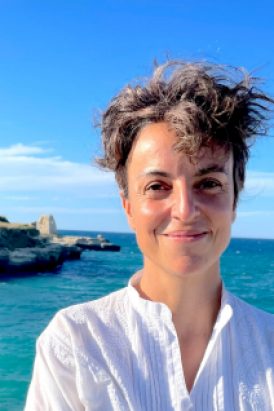Giulia Saltini Semerari
- Assistant Curator of Mediterranean Archaeology, Museum of Anthropological Archaeology
- Assistant Professor, Department of Anthropology

- Email: giulias@umich.edu
- Office: Suite 3010 School of Education Bldg (Rm 3036). 610 E. University Avenue, Ann Arbor, MI 48109-1259
- Ph.D. 2011 University of Oxford, UK
- CV
Research Interests
Topical/Theoretical
- The archaeology of culture contacts
- Mediterranean connectivity
- The Greek colonization
- Gender archaeology
- Intersections between bioarchaeology and archaeology
Geographical
- Southern Italy
- Albania
- Greece
Research Description
My research seeks to harness the Mediterranean’s rich archaeological record to reconstruct and model diverse aspects of culture contact. In particular, I am interested in understanding how small and large-scale socioeconomic dynamics affect long-term fluctuations in connectivity during the end of the second and first millennia BCE. Geographically, my work is focussed on Aegean migrations to southern Italy on the one hand, and on cross-Adriatic connections on the other.
While my PhD investigated long-term, large-scale patterns of exchange and migration between Italy and Greece, more recently I have concentrated on the Greek colonization of southern Italy, where I am conducting a multidisciplinary project titled Ancient Mediterranean Interactions between Colonizers and Indigenous populations (AMICI). A collaboration between the Universities of Tübingen, Leiden and the VU University in Amsterdam, it was first funded through a Marie Curie Intra-European Fellowship and later a Gerda Henkel Research Scholarship. This project combines comprehensive bioarchaeological analyses with more traditional material culture studies in order to reconstruct interregional mobility and admixture patterns, and to gauge their impact on the social and cultural development of coastal and inland settlements.
In addition to shedding light on these historical trajectories of Mediterranean contacts, our datasets are allowing us to investigate broader anthropological issues surrounding the complex relationship between constructed social identities and biological information. For example, our understanding of gender dynamics in Early Iron Age southern Italy, a long-standing interest of mine, is being transformed both in terms of how they were shaped by, and in turn shaped, the Greek colonization of this regions, a process that we are increasingly certain involved intermarriage between locals and newcomers. To investigate the interplay between ancient colonizations and gender dynamics in a broader Mediterranean contexts, I am also co-organizing an international research group with the aim of providing peer support and a collaborative framework for comparative research on this theme (Gendyterranean project).
Most recently, I am conducting a field project aimed at understanding long term shifts in Adriatic connectivity by honing in two river valleys in southern Italy and Albania. This project, which will include both fieldwork and archaeometric analyses, is conducted in collaboration with colleagues at the Universities of Durres, Lecce, Bari and VU Amsterdam.


